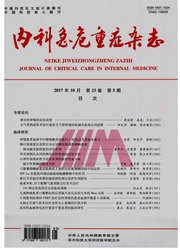

 中文摘要:
中文摘要:
肾病综合征(NS)是由于肾小球基底膜损伤、肾小球滤过屏障破坏而引起血浆蛋白质大量于尿中丢失所产生的病理生理状态。临床分为原发性和继发性两大类。原发性肾病综合征(INS)多为免疫炎症介导,糖皮质激素和免疫抑制剂是其主要治疗药物。激素抵抗、激素依赖和频繁复发的NS属于难治性肾病综合征的范畴,其对药物治疗反应差,易进展至终末期肾衰竭。影响NS疗效的主要因素包括病理类型、治疗不规范、并发症等。近年来基因组学和蛋白质组学技术显示单基因突变和潜在的循环因子与NS激素抵抗相关。不同年龄阶段激素抵抗的NS患者病原学影响因素不同。因此,进一步从遗传和分子学水平探讨NS发病机制及早期预警治疗反应性的生物学标记,实现精准诊断和治疗,对提高NS疗效、减少药物毒副反应及改善预后具有重要的指导作用。
 英文摘要:
英文摘要:
Nephrotic syndrome is a pathophysiological condition caused by dysfunction of glomerular filtration barrier,which allows the massive flow of plasma proteins into the urine. It can be divided into the primary forms and the secondary forms according to its etiology. Idiopathic nephrotic syndrome(INS) is mostly immunoinflammation-mediated. Response to steroids or other immunosuppressives, the initial mainstay of therapy,is closely related to the prognosis of this disease. Steroid-resistant NS, steroiddependent NS,and frequently-relapsed NS all belong to the category of refractory NS. Their poor responding to immunosuppression leads to a high risk for end-stage renal failure. The main factors which affect its efficacy include histopathological patterns,substandard treatment,and complications,etc. Since the advent of next generation sequencing and proteomics techniques,advancements in genetic and molecular profiling have shown that single-gene mutations and the potential circulating factors might be involved in the mechanisms of steroid-resistant NS. And the impact of different etiologic factors across age groups represents differently. Therefore,to minimize unnecessary immunosuppression and to adapt precise treatments based on likely mechanisms,further understanding of the underlying etiology at a molecular level as well as early identification of biomarkers that predict the response to treatment or recurrences will hold great significance for the improvement of efficacy and patients' outcomes.
 同期刊论文项目
同期刊论文项目
 同项目期刊论文
同项目期刊论文
 期刊信息
期刊信息
